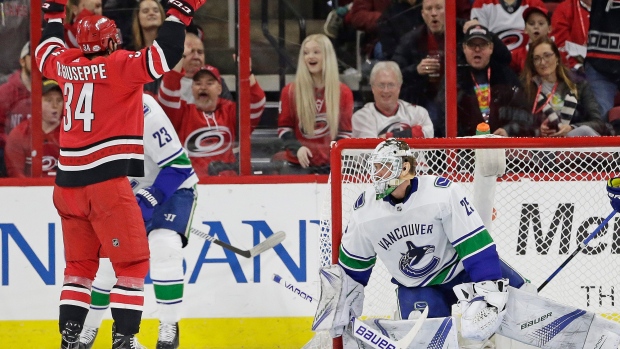Feb 10, 2018
Canucks sluggish starts have to stop
The team has given up the first goal in 32 of their 55 games this season, including five times, most recently against the Carolina Hurricanes Friday, in the first minute of play.

DALLAS – If you didn’t know any better, you’d think every game starts with the Vancouver Canucks trailing 1-0. It doesn’t actually happen like that, it only feels that way. But Friday in Carolina, the Canucks essentially did start the game down a goal as the Hurricanes opened the scoring just 14 seconds in when defenseman Brett Pesce finished off a red wave that attacked the Vancouver net on the game’s first shift. And that was after the Canucks won the draw and controlled the puck.
The Canucks simply aren’t good enough to be spotting any opponent an early advantage and yet they’ve dug themselves a deficit in five straight games and 10 of their last 12. On this forgettable season that is now into a death spiral, the Canucks have fallen behind in 32 of their 55 games. Only the Edmonton Oilers and Los Angeles Kings have had a greater knack for giving up the opening goal – the Oilers and Kings have each done so on 33 occasions.
Shockingly, the Canucks have yielded the first goal within the first five minutes of a game 18 times this season and Friday against the ‘Canes was the fifth time it’s happened in the opening minute of play. Before Friday’s quick goal against, the Kings opened the scoring at the 23 second mark, the San Jose Sharks needed 48 seconds, the Anaheim Ducks at 56 seconds, and the Buffalo Sabres jumped on the Canucks at the one minute mark.
“I don’t see a trend in it,” Canucks head coach Travis Green said when presented with the evidence following last night’s loss. “There have been some goals the goalies would probably want back, but it’s also on our team. On the very first shift, we win a face-off right away and don’t get the puck in deep and they score. You have to execute. You have to be able to make passes or you’re going to spend the whole game in your own zone. We could not make a play.”
Slow starts are leading to long nights for the Canucks who’ve dropped four straight games. Pulling even in against the Florida Panthers on Tuesday was the only time on this skid the Canucks have managed to respond to the first goal against. Twice against the Tampa Bay Lightning the Canucks dug themselves 3-0 deficits and the same thing happened Friday in Carolina.
Some teams have the firepower to overcome a stumble from the gate. The Canucks aren’t one of those teams. They sit 28th in scoring, averaging 2.56 goals per game. With a pop-gun attack like that, a 1-0 deficit must feel insurmountable many nights.
“It’s bad,” said goalie Jacob Markstrom who has become the speaker of truth in the Canucks locker room after recent losses. “We talk about they’re going to come out hard and we need a good start and we do the complete opposite. Two turnovers and then a goal. It’s bad. It’s small details. It’s really bad. We’re not playing good hockey.”
The Canucks next chance to get off to a better start comes Sunday afternoon in Dallas against the surging Stars who have won five straight after a 4-3 shootout victory over the defending Stanley Cup champion Pittsburgh Penguins on Saturday.
The Stars are sixth in the league in total goals scored (171) and have opened the scoring 29 times this season. They are also an impressive 23-5-1 when they get the jump on their opponent. With the kind of firepower they boast in Tyler Seguin, Jamie Benn, and Alexander Radulov, the Canucks have no choice but to be wary from the drop of the puck.
With injuries again taking a toll on this team which will be playing its third game in four nights and fourth in six days, any Canuck in uniform on Sunday has to take it as a personal challenge to be better from the start of the game than they’ve been in recent outings. Even at that, it’s far from any kind of guarantee that the Canucks will be able to keep the Stars off the board.
It would be nice, though, if they could get out of the first minute without falling behind.
“It’s a shot in the gut, especially when you’ve lost three in a row already, and they get one right away,” Bo Horvat said of the team’s latest early game letdown. “It’s kind of disheartening and it takes the wind out of your sails. We have to find a way to be better.”
So often hockey players fall back on the ‘need to play a full 60 minutes’ cliché. The problem for the Vancouver Canucks this season is that far too often the final 59 minutes haven’t mattered much because the outcomes are determined almost as soon as the game has begun.

